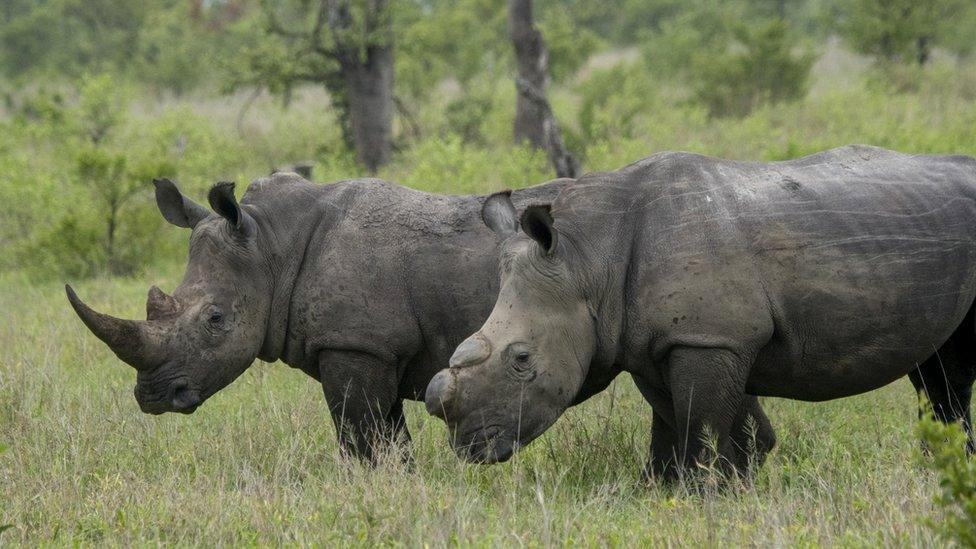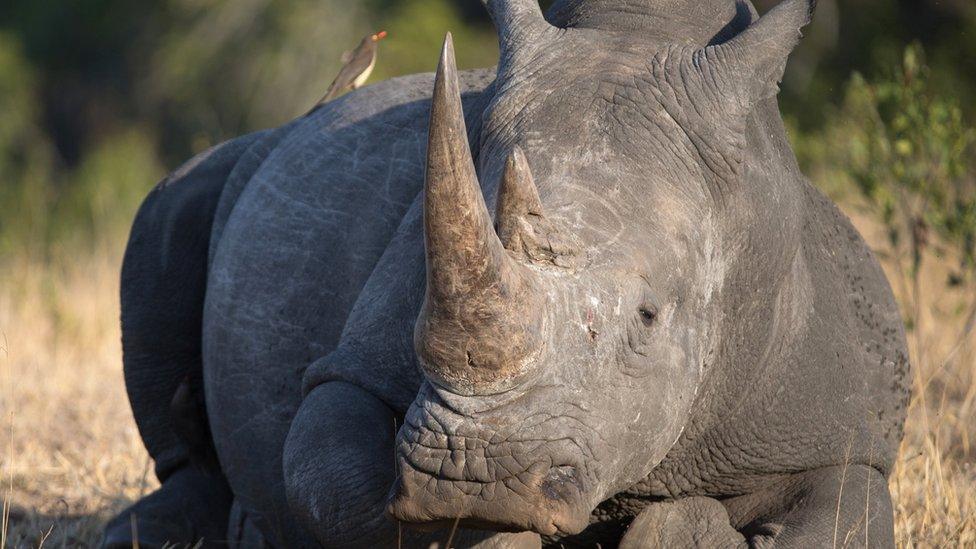Rhino poaching in South Africa falls during Covid-19 lockdown
- Published

Some rhinos in South Africa have been dehorned to save them from poachers
South Africa has reported a decline in the number of rhinos killed by poachers, which officials say is partly the result of Covid-19 lockdowns.
Last year, 394 rhinos were killed for their horns in the country, a fall of 33% from the 594 recorded in 2019, the environment ministry said.
Lockdowns had restricted the movements of would-be poachers and rhino horn smugglers, it added.
It is the sixth year that recorded incidents in the country have fallen.
But conservationists warn that the rhino population in South Africa has plummeted in recent years and that poaching remains a big problem.
Environment Minister Barbara Creecy said strict measures to prevent the spread of coronavirus infections last year had led to "a significant reduction in poacher incursions", external to the world-famous Kruger National Park, near the Mozambique border.
"However, that changed later in the year as the lockdown levels eased," she said in a statement published on Monday.
Ms Creecy added that while the "extraordinary circumstances surrounding the battle to beat the Covid-19 pandemic" had contributed to the decrease in poaching in 2020, rangers, security personnel and government efforts to tackle the issue also played "a significant role".

Rhinos in South Africa:
South Africa is home to about 80% of Africa's rhino population
Hundreds are killed every year for their rhino horn
Most are destined for Asia where rhino horn is an ingredient in medicine and herbal remedies
Rhino horns are made of keratin - the same substance as fingernails
But it is worth more by weight than cocaine, and so traffickers go to great lengths to smuggle it out of Africa

However, conservationists say there has been a near 70% decline in the rhino population recorded at the Kruger National Park - where most of the poaching takes place - over the last decade.
Dr Jo Shaw of the World Wide Fund for Nature (WWF) in South Africa said that while she welcomed a reduction in the number of rhinos lost to poaching, "we are very aware that the apparent reprise provided by lockdown restrictions in 2020 was only a temporary pause".
"To stop rhino poaching, we need to address the factors that enable wildlife trafficking syndicates to operate," Dr Shaw told the BBC.
She said that these included ensuring that resources were made available, a commitment was made to "root out corruption" and factors that cause criminal behaviour - "such as lack of opportunities, high levels of inequality and breakdowns in social norms" - were addressed.
Could farming rhinos save them from extinction?
Prof Keith Somerville of the University of Kent's Durrell Institute of Conservation and Ecology (DICE) in the UK, said Ms Creecy's comments were "a desperate and transparent attempt to put a positive spin on the problem of rhino poaching and the attempts to reduce it".
He said that any reduction in poaching caused by the pandemic is "unlikely to be maintained when current restrictions end in South Africa".
Prof Somerville said a report by South African National Parks, external, which states that anti-poaching efforts have improved in recent years, "failed to note the continued decline" or to calculate the difference in percentage of the killings at the Kruger park in relation to the overall rhino population.
"So there is a marginal improvement, but related to a far smaller population," he said, adding: "There are fewer rhino and so are hard to find and kill."
A total of 769 rhinos were killed for their horns in South Africa 2018, compared with 1,028 in 2017, official statistics show.
Rhino horns are in huge demand in Asian states such as China and Vietnam, where they are used in traditional medicines.
Related topics
- Published18 March 2020
